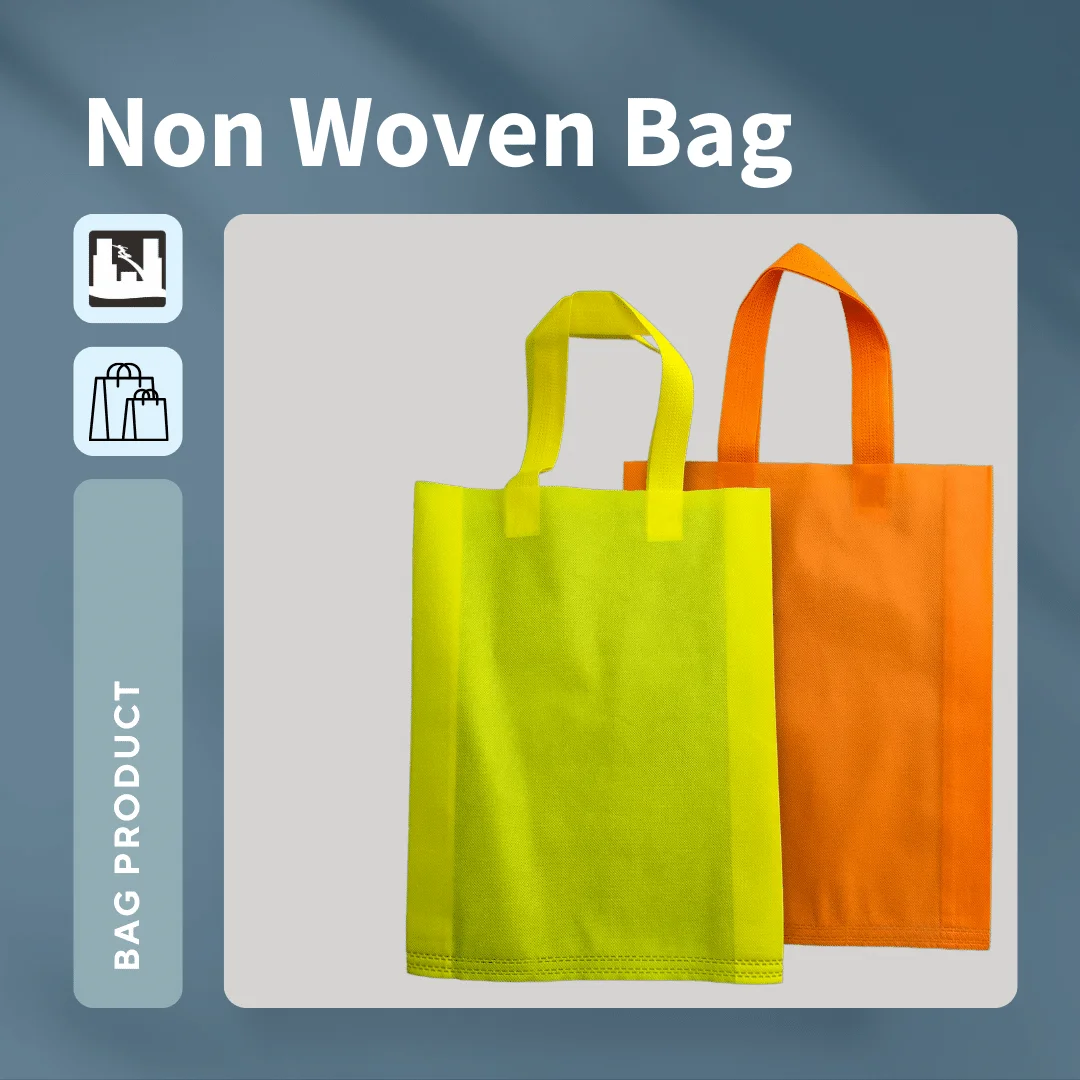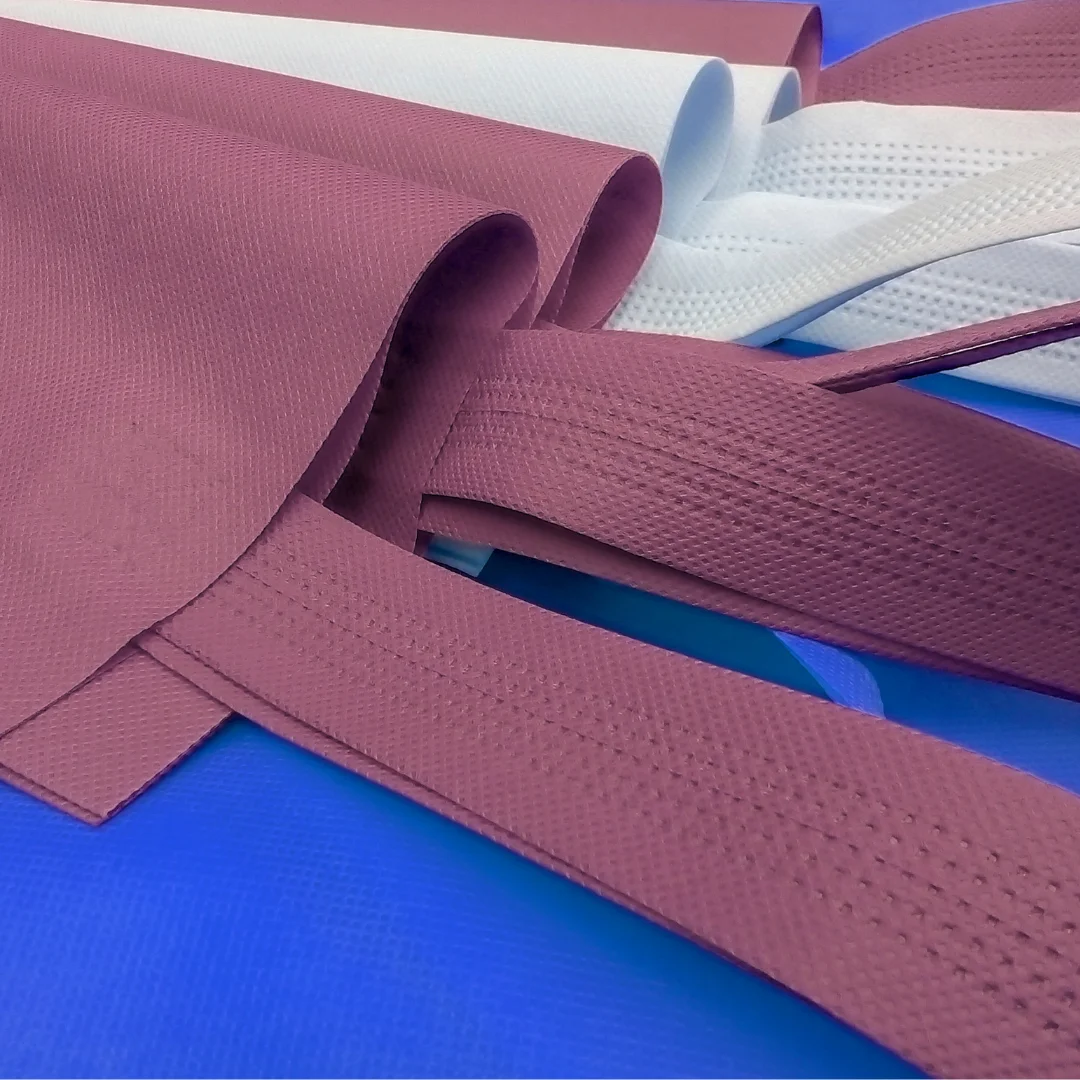Non Woven Bag
Eco-Friendly Non-Woven Bags Product Description
Non-woven bags, often called spunbond bags, are a modern solution to reduce single-use plastic waste. Made from spunbond polypropylene, these bags are lightweight yet incredibly durable, offering excellent tear resistance and water-resistant properties, perfect for your everyday shopping needs! Not only are they functional, but they can also be customized with your logo or favorite design, making them a popular choice for businesses aiming to stay eco-friendly while looking stylish.
But their usefulness doesn’t stop there. In agriculture, these bags protect crops from extreme weather, while in construction, they play a role in filtration and material separation. Available in various sizes, colors, and designs, non-woven polypropylene bags can be tailored to meet your exact needs. Practical, long-lasting, and environmentally conscious, these bags are the ultimate solution for businesses and industries looking to make a sustainable impact!
Why Non-Woven Bags Are the Perfect Choice
What sets non-woven bags apart from other options? Besides being eco-friendly, these bags boast numerous features that make them stand out in the market. Designed for repeated use, they provide a cost-effective alternative for shopping or promotional needs. The strong material, made from spunbond polypropylene fabric, ensures they can hold up to 10 kg of weight, making them versatile for all kinds of uses. Moreover, they are easy to fold and store, making them practical to carry wherever you go. Not just functional, non-woven polypropylene bags are available in various colors and designs, allowing you to choose one that fits your style and requirements.
Customizable for Branding and Promotion
For businesses, non-woven bags are a perfect promotional tool. With custom printing services, you can add your logo or personalized message to these bags, turning them into an effective and eco-friendly marketing medium. Imagine your customers carrying spunbond bags with your company’s logo, promoting your brand wherever they go. Additionally, with a variety of sizes and colors to choose from, you can create a bag design that truly represents your company’s identity. Not only are these bags practical, but they also showcase your commitment to sustainability, a valuable trait that resonates with today’s environmentally conscious consumers.
Versatile Applications Across Industries
Non-woven bags aren’t just popular in retail; their applications extend across various industries. In agriculture, these non-woven polypropylene bags serve as protective covers for crops, shielding them from extreme weather conditions and improving harvest outcomes. In the construction industry, these bags, made from spunbond polypropylene fabric, are used for filtration and material separation, demonstrating their durability in demanding work environments. Even in promotional events, these spunbond bags are a preferred choice for goodie bags, offering a professional and eco-friendly impression. Their adaptability makes them one of the most versatile products on the market.
Technical Specifications That Meet Your Needs
Our non-woven bags are meticulously crafted to ensure the highest quality and functionality. Made from spunbond polypropylene fabric with a thickness range of 70–120 GSM, these bags are built to handle up to 10 kg without compromising their flexibility. Available in standard or custom sizes, you can choose the specifications that best suit your specific requirements. A wide range of color options allows you to align the bags with your brand identity or event theme. With guaranteed high performance, these non-woven polypropylene bags are suitable for daily use or industrial needs alike.
Order Your Non-Woven Bags Today!
Ready to make the switch to a practical, stylish, and eco-friendly solution? Our non-woven bags, made from durable spunbond polypropylene fabric, are the perfect choice for those looking for versatile products with sustainable benefits. Contact us today for more information, and let our team help you find the right bag for your needs. With flexible customization options and top-tier quality, our non-woven polypropylene bags are here to support your journey toward a greener future.
What does non-woven bag mean?
Are non-woven bags good or bad?
Non-woven bags are generally good for the environment compared to single-use plastic bags. They are reusable, durable, and often recyclable, reducing the need for disposable bags. However, they still have an environmental impact due to their plastic content and the energy-intensive manufacturing process. While not a perfect solution, they are a better alternative to single-use plastics, helping to reduce waste and environmental pollution if used and disposed of responsibly.
What is non-woven bag fabric called?
The fabric used in non-woven bags is commonly known as non-woven polypropylene (PP) fabric. This material is created by bonding polypropylene fibers together without weaving or knitting, typically through a process like spun bonding or melt blowing. Non-woven PP fabric is known for its durability, strength, and lightweight properties. It’s also resistant to moisture and chemicals, making it a popular choice for reusable shopping bags, promotional totes, and various packaging applications.
What is the difference between a non-woven bag and a paper bag?
Non-woven bags and paper bags differ significantly in material, durability, and environmental impact. Non-woven bags, made from polypropylene, are stronger, more water-resistant, and reusable, whereas paper bags, made from wood pulp, are biodegradable but less durable and prone to damage when wet. Non-woven bags have a longer lifespan, reducing the need for frequent replacement, but their production is more energy-intensive than paper bags. Paper bags are better for composting but have a shorter use life.
Are non-woven bags waterproof?
What is the GSM of non-woven bags?
The GSM (grams per square meter) of non-woven bags typically ranges from 30 to 120 GSM, indicating the thickness and density of the fabric. Lower GSM values, like 30-60 GSM, are used for lightweight bags, suitable for limited reuse. Bags with higher GSM values, such as 70-120 GSM, are sturdier, more durable, and ideal for repeated use. The choice of GSM depends on the intended use, with higher GSM providing greater strength and longevity for the bag.
How do you clean a non woven bag?
To clean a non-woven bag, gently hand wash it in warm, soapy water. Avoid using harsh detergents or scrubbing too vigorously, as this can damage the material. Rinse thoroughly to remove soap residue. Do not wring the bag; instead, press out excess water gently. Air dry the bag by hanging it or laying it flat, avoiding direct sunlight to prevent fading. Machine washing or drying is not recommended, as it can deteriorate the bag’s structure and appearance.
Is non woven fabric made of plastic?
Yes, non-woven fabric is typically made of plastic. The most common type of plastic used is polypropylene, a thermoplastic polymer. This material is chosen for its strength, lightweight, and cost-effectiveness. In the production process, polypropylene fibers are bonded together mechanically, thermally, or chemically to form the fabric, without the traditional weaving or knitting. While this makes non-woven fabric practical and versatile, it also means that it’s not biodegradable like natural fibers.
Can non woven bags be recycled?
Non-woven bags can be recycled, but the process is more complex than recycling paper or certain other plastics. Made from polypropylene (a type of plastic), these bags require specialized recycling facilities capable of processing this material. Not all curbside recycling programs accept them, so it’s important to check local recycling guidelines. Additionally, the mixed composition of some bags, like those with metallic inks or laminations, can complicate recycling. Reusing these bags as much as possible before recycling is recommended.
Is non-woven fabric strong?
Non-woven fabric is generally strong and durable, especially considering its lightweight nature. Its strength comes from the way polypropylene fibers are bonded together, either through chemical, thermal, or mechanical means, without weaving or knitting. The fabric’s strength can vary based on its GSM (grams per square meter); higher GSM non-woven fabrics are thicker and stronger. This makes them suitable for a variety of applications, including reusable shopping bags, medical gowns, and filters, where durability is essential.




